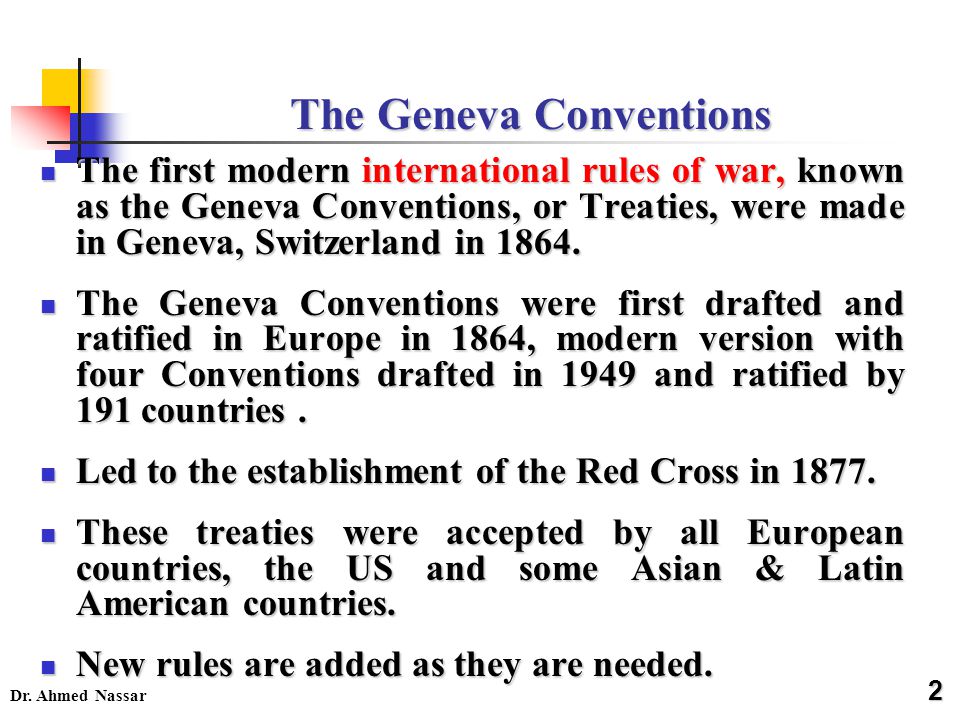Ahmedabad
(Head Office)Address : 506, 3rd EYE THREE (III), Opp. Induben Khakhrawala, Girish Cold Drink Cross Road, CG Road, Navrangpura, Ahmedabad, 380009.
Mobile : 8469231587 / 9586028957
Telephone : 079-40098991
E-mail: dics.upsc@gmail.com

Geneva Conventions Guidelines
News: As the evidence of casualties in the civilian population continues to mount, the world will increasingly look to the Geneva Conventions in the Russia-Ukraine conflict.
Background:
• These are a set of four treaties, formalized in 1949, and three additional protocols, which codify widely accepted ethical and legal international standards for humanitarian treatment of those impacted by war.
• The focus of the Conventions is the:
o Treatment of non-combatants and prisoners of war, and
o Not the use of conventional or biological and chemical weapons
What are the four Geneva Conventions?
• First Geneva Convention: Health and Medical Issues
o It protects wounded and sick soldiers on land during war.
o This convention extends to medical and religious personnel, medical units, and medical transport.
o It has two annexes containing a draft agreement relating to hospital zones and a model identity card for medical and religious personnel.
• Second Geneva Convention: Offshore Protection
o It protects wounded, sick and shipwrecked military personnel at sea during war.
o This convention also extends to hospital ships and medical transports by sea, with specific commentary on the treatment and protections for their personnel.
• Third Geneva Convention: Treatment of Prisoners of War (PoW)
o It applies to prisoners of war, including a wide range of general protections such as humane treatment, maintenance and equality across prisoners, conditions of captivity, questioning and evacuation of prisoners, transit camps, food, clothing, medicines, hygiene and right to religious, intellectual, and physical activities of prisoners.
• Fourth Geneva Convention: Civilian protection of occupied territory
o It particularly applies to the invasion of Ukraine by Russian military forces.
o It protects civilians, including those in occupied territory.
o Comprising 159 articles, it outlines the norms for this critical dimension of conflict.
Present context:
• Along with the Additional Protocols of 1977, the Fourth Convention expounds upon the:
o General protection of populations against certain consequences of war
o Conduct of hostilities and the status and
o Treatment of protected persons
o Distinguishing between the situation of foreigners on the territory of one of the parties to the
conflict and that of civilians in occupied territory
• This convention also spells out the obligations of the occupying power vis-à-vis the civilian population and outlines detailed provisions on humanitarian relief for populations in occupied territory.

Address : 506, 3rd EYE THREE (III), Opp. Induben Khakhrawala, Girish Cold Drink Cross Road, CG Road, Navrangpura, Ahmedabad, 380009.
Mobile : 8469231587 / 9586028957
Telephone : 079-40098991
E-mail: dics.upsc@gmail.com
Address: A-306, The Landmark, Urjanagar-1, Opp. Spicy Street, Kudasan – Por Road, Kudasan, Gandhinagar – 382421
Mobile : 9723832444 / 9723932444
E-mail: dics.gnagar@gmail.com
Address: 2nd Floor, 9 Shivali Society, L&T Circle, opp. Ratri Bazar, Karelibaugh, Vadodara, 390018
Mobile : 9725692037 / 9725692054
E-mail: dics.vadodara@gmail.com
Address: 403, Raj Victoria, Opp. Pal Walkway, Near Galaxy Circle, Pal, Surat-394510
Mobile : 8401031583 / 8401031587
E-mail: dics.surat@gmail.com
Address: 303,305 K 158 Complex Above Magson, Sindhubhavan Road Ahmedabad-380059
Mobile : 9974751177 / 8469231587
E-mail: dicssbr@gmail.com
Address: 57/17, 2nd Floor, Old Rajinder Nagar Market, Bada Bazaar Marg, Delhi-60
Mobile : 9104830862 / 9104830865
E-mail: dics.newdelhi@gmail.com